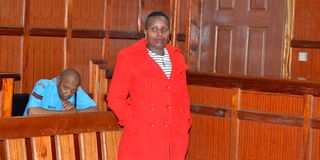Ruiru distiller CEO loses appeal in Sh163m KRA tax battle

Mary Kinyua, the CEO of Platinum Distillers Limited before a Milimani Court on Tuesday, March 12, 2019 where she was charged with tax evasion amounting to Sh41 million.
Platinum Distillers Limited Chief Executive Officer Mary Wanjiru Kinyua has lost a Sh163 million tax dispute with the Kenya Revenue Authority (KRA) after a court dismissed her appeal.
The court however directed the taxman to apply the correct individual graduated rate of tax to her income. The company manufactures and distributes alcoholic beverages.
Ms Kinyua wanted the court to overturn a decision of the Tax Appeals Tribunal that threw out her appeal against the taxman’s finding that her tax liability inclusive of penalties and interest is more than Sh163 million. Plea
But Justice David Majanja upheld the Tribunal’s ruling that Ms Kinyua failed to produce sufficient documentation to dislodge the findings of the KRA’s commissioner of investigations and enforcement.
In the tribunal’s judgment dated June 18, 2021, it was found that she ought to have presented a breakdown of what was received in her bank accounts on her behalf against the collections for the company but that she did not endeavor to do that.
Instead, she had made a general claim that all the funds received in the bank accounts were payments for the company.
Justice Majanja ruled that the businesswoman failed to support her claim of the financial deposits in the bank accounts by way of documentation and a breakdown of what was received on her behalf against the collections for the company.
“I agree with the Tribunal and the Commissioner that the company resolutions were not sufficient to demonstrate that the sums being received in the Appellant’s accounts were collections from the Company,” said Justice Majanja.
“Apart from them being general, the Appellant ought to have provided adequate documentation chain-linking the deposits in her accounts to the Company,” said the judge.
However, he directed the KRA to review its decision dated July 22, 2019, that Ms Kinyua’s tax liability inclusive of penalties and interest was Sh163,897,497.
He directed the Commissioner to apply the correct individual graduated rate of tax to Ms Kinyua’s income.
The order stemmed from Ms Kinyua’s claim that the Commissioner was wrong in taxing her bankings at the corporate rate of 30 rather than the resident individual rate on a graduated scale.
Justice Majanja stated that the Tribunal erred in failing to find that the corporate tax rate should not have been applied to Ms Kinyua.
“The Commissioner was assessing the Appellant’s income and not the income of a resident corporation. It is the loans and money coming from other sources that were deemed to be her income hence there was no basis for the Commissioner to apply a corporate flat rate of 30 percent as opposed to the individual graduated rate,” said the judge.
He added that Income Tax Act is emphatic that individuals are always charged according to an individual graduated tax rate and not the corporate flat rate of 30 percent in ascertaining their business or employment income.
The genesis of the tax dispute are investigations carried out into the tax affairs of the company and its directors including Ms Kinyua in early 2019.
KRA notified her of additional assessments for the income years 2014-2017. The Commissioner of investigations stated that she had been filling nil income tax returns for that period and that an analysis of her bank deposits at Equity Bank and KCB Bank and a joint account with one of the directors, OMM were adjusted to a total of Sh417,861,296.
In arriving at this sum, the Commissioner held that it made adjustments to her bank receipts including adjustments for bounced/unpaid cheques and that the net bankings in the joint account had been distributed equally between her and her co-director.
As a result, the Commissioner assessed the Appellant’s tax liability inclusive of penalties and interest at Sh249,579,296.
The figure was reviewed down to Sh163,897,497 after she objected and faulted the Commissioner for not taking into account the loans and other personal bankings into the said accounts and the business expenses incurred in generating the income.





